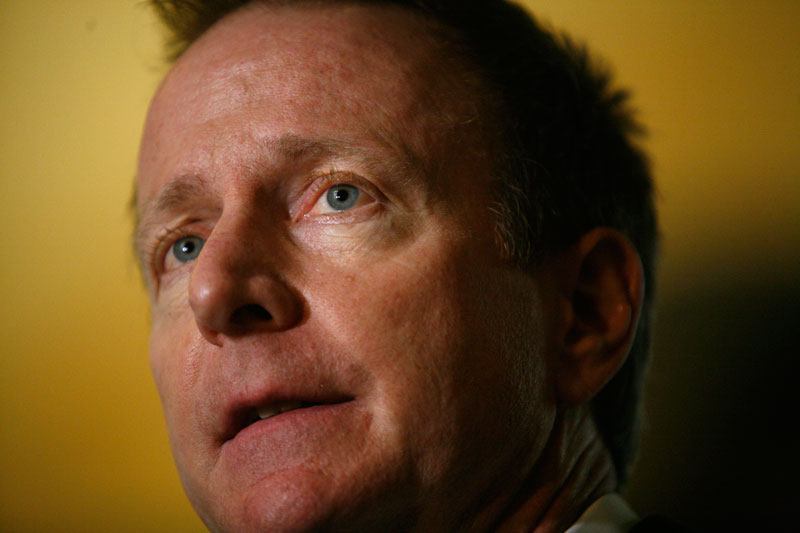A billionaire, a fired publisher, and a spectacle at the LA Times
THE SIGNS OF PERIL had long been visible at the Los Angeles Times. But it was a letter, of all things, that caused matters to detonate.
The September correspondence was unusual not only because of the people who sent it, but because of the events that led to it. In August, Angeleno billionaire Eli Broad began preliminary talks with the board of Tribune Publishing about buying the Times from the national chain. The board eventually rejected the overture, right around the time it voted to fire the Times’ publisher and chief executive, Austin Beutner. He was just one year at the helm.
Broad and Beutner have a shared history of trying to take control of theTimes. For the past decade, Broad has expressed interest in getting the Chicago-based parent company to sell him the paper. And two years ago, Beutner joined him in that effort, just a year before Beutner would be named publisher. The connection led some Times staffers to wonder whether Beutner’s ouster had come in response to what they characterized as a “hostile takeover” attempt of the newspaper.
Beutner, at odds with the Chicago mothership throughout his short tenure, tells CJR that “I was aware but not involved” in Broad’s offer. Broad did not respond to multiple requests to be interviewed for this article. A Tribune Publishing spokesman declined to comment on the circumstances of Beutner’s termination.
Regardless of whether the two events were related, they’ve been linked by the letter—sent to Tribune Publishing’s board days after Beutner’s September 8 departure. More than 50 local influentials, including business leaders, philanthropists, and two former mayors, protested Beutner’s firing. “As you move ahead,” it reads, “we strongly urge you to continue with leadership that knows and loves Los Angeles and shares our commitment to its future.” Broad’s name sat inconspicuously midway down the list. Left unmentioned were continuing discussions in local circles about possibly buying the Times. Those circles, it should be noted, often radiate from Broad.

Austin Beutner, former publisher and chief executive of the Los Angeles Times (Getty Images / Bob Chamberlin)
The public drama was perhaps unprecedented among the nation’s top newspapers: a national chain firing a publisher whose billionaire associate made an unwanted attempt to buy the chain’s flagship property. The sequence of events made for a bizarre, high-stakes circus that shows few signs of abating.
“There’s still very serious interest in trying to buy the LA Times to maintain its local connection and coverage,” says Mickey Kantor, a former US Secretary of Commerce who signed the letter and has become a sort of informal spokesman for the cause. “There is great disappointment in what Tribune did, not only in removing Austin Beutner, but also not assuring the Times would maintain its stance as the leading outlet in Southern California.”
The correspondence also touched off an unusual lobbying campaign among the upper crust of the local political class, aiming to pressure Tribune Publishing to sell. Within days, a dozen city council members sent a similar letter, while the county board of supervisors unanimously passed a resolution calling for local ownership. Members of the state legislature and civic leaders from the San Fernando Valley added their own respective letters in the following weeks.
It was a peculiar confederation to be sure, especially given that theTimes’ civic mission relies on vigilance and skepticism toward such powerful interests. But uncertainty lays fertile ground for the seeds of desperation, and the Times newsroom has repeatedly found itself a struggling protagonist in the more than decade-long tragedy of American newspapers. After Tribune Publishing announced in Octoberyet another round of staff cuts—like déjà vu all over again—the newsroom, too, joined the chorus.
“Tribune [ownership] has been a nightmare in many ways,” says one veteran staffer, who like others was granted anonymity to speak freely. “Everyone is deeply skeptical of anything they’re involved in. So yeah, people are definitely talking about the possibility that we’re going to be sold.”
Tribune Publishing, for its part, has publicly maintained its commitment to the Times, the largest of the conglomerate’s 11 major daily newspapers. “Our California News Group, which includes the Los Angeles Times and The San Diego Union-Tribune, is a cornerstone of our Company’s portfolio and a key component to our success in the future,” it said in a Sept. 17 statement.
Interviews with a dozen current and former Times staffers illustrate a newsroom that’s deeply distrustful of its parent company’s motives. The A billionaire, a fired publisher, and a spectacle at the LA Times - Columbia Journalism Review:

